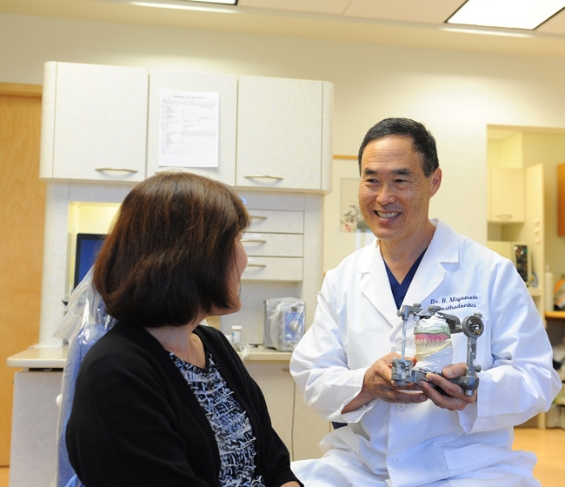Prosthetics For Mouth And Face
Dr. Richard H. Miyamoto
Maxillofacial prosthodontist
Where did you receive your schooling and training?
I graduated from Northwestern University Dental School as a doctor of dental surgery. My postdoctorate training includes a general practice residency at The Queen’s Medical Center, prosthodontic residency at the University of Texas Health Sciences Center at San Antonio, fellowship in maxillofacial prosthodontics (prosthetics for the mouth and face) at the MD Anderson Cancer Center in Houston, Texas, and fellowship in implant prosthodontics at the UCLA Medical Center-Implant Clinic in Los Angeles.
dih_2
How long have you been in practice?
I have been in private practice for 21 years.
Can you talk about what you do as a maxillofacial prosthodontist?
I am a prosthodontist with subspecialty training in maxillofacial and implant prosthodontics. Prosthodontics is the dental specialty pertaining to the diagnosis, treatment planning, rehabilitation and maintenance of oral function, comfort, appearance and health of patients with missing or deficient teeth and/or oral and maxillofacial tissues using biocompatible materials.
Prosthodontists are trained for prosthetic needs primarily in the mouth.
Maxillofacial prosthodontists are prosthodontists with extra training who are able to provide facial prosthetics as well as dental-mouth prosthetics, especially patients affected with cancer, trauma and congenital defects.
Who tends to need the prosthetics that you offer?
The majority of my patients are those needing conventional treatments, which include dental esthetics, crowns, veneers, bridges, dentures, removable partials, bite reconstruction or correction, dentures, implant rehabilitation and temporomandibular joint (TMJ) dysfunction.
Approximately 5 to 10 percent of my practice involves patients referred by physicians, who were diagnosed with head and neck cancer or trauma. Maxillofacial prosthodontics treat patients who have acquired or congenital defects of the head and neck (maxillofacial) region because of cancer, surgery, trauma or birth defects. Maxillary (upper jaw) obturators, speech-aid prostheses and mandibular-resection (lower jaw) appliances are commonly planned and fabricated by the maxillo-facial prosthodontist after surgery to remove tumors or for trauma patients with significant jaw defects. Prostheses that may benefit from dental implant support include artificial eyes, nose, ears and other facial pros-theses customized to a patient’s needs.
Radiation stents are designed by the maxillo-facial prosthodontist, in conjunction with a radiation oncologist’s prescription, to protect healthy tissue or enhance radiation therapy results in a patient’s battle with cancer of the head, neck and oral cavity. Management of oral cancer patients undergoing surgery, radiation therapy and chemotherapy is further benefited by a maxillofacial prosthodontist’s supervision and treatment by decreasing risk of post-treatment complications, which can include an inability to swallow, speech impediment, rampant decay or periodontal disease and osteoradionecrosis, which is a form of bone infection associated with post-radiation effects. Treatment for cancer, trauma or congenitally defective patients is typically multidisciplinary, involving oral and maxillofacial surgeons, head and neck surgeons, plastic surgeons, ENT (ear, nose and throat) doctors, oncologists and speech-physical therapists.
Are the prosthetics permanent?
Depending on the type of prosthetics needed, it can be either fixed or removable. A fixed pros-thesis is either cemented, as with a bridge or crown, or screwed onto implants, thus making the prosthesis permanently secured in the mouth. A removable pros-thesis, or one that’s taken off at night, is typically secured with wire clasps engaging teeth or with special attachments engaging dental implants.
Are they mostly esthetic or functional?
Esthetics and function are always considered when treating a patient. Depending on the patient’s needs and desires, the primary focus may differ. A cancer patient with a tumor on the tongue, palate or lower jaw will primarily need to restore function after surgery. Otherwise, speech, chewing and swallowing will be severely problematic. A traumatized patient who fractures his upper s As you can see from these all on 4 before and after photos dental prosthetics can really improve a person’s appearance and, therefore, their confidence.ix incisor teeth will want esthetics restored for psychosocial reasons and to be able to maintain proper function. Losing a single upper incisor tooth would be exclusively an esthetic issue, since remaining teeth maintain normal function.us, the All on four dental implants cost can be relatively low when compared to other dental treatments available. For a maxillo-facial prosthodontist, patients with anatomic compromises now have an option with dental implants for improved results, reducing limitations that were common in the past. A maxillofacial prosthodontist’s extensive knowledge in anatomy of the head, neck and oral region combined with expertise in prosthetics and implants gives patients with comprehensive needs an opportunity to re-establish quality of life. Proper planning, coordination of multimodal treatments, administering appropriate prosthetic treatments and post-treatment care are vital in ensuring patient satisfaction and treatment success.






